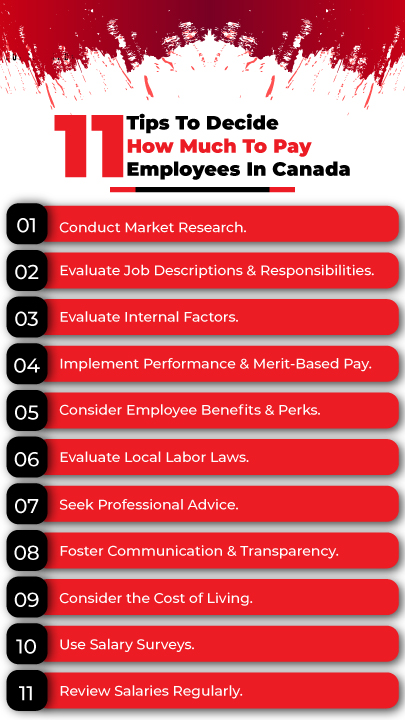
Decide How Much To Pay Employees In Canada
Deciding how much to pay employees is a critical task that requires a thoughtful and strategic approach, and it’s crucial for any organization's success.
It ensures employees feel motivated to give their full attention to the firm and helps recruit and keep top talent.
Employee compensation is essential for attracting and retaining top talent and encouraging and honoring staff for their contributions.
However, setting the right salary takes work as it requires a thorough understanding of the job market, industry trends, and the organization's financial position.
This blog will discuss 11 tips to help you set the right employee salary.
Following these useful tips can ensure fair and competitive compensation practices that align with market standards and support your organization's success.
Read More: 7 Best Ways To Effectively Manage Employee Performance.
11 Tips To Decide How Much To Pay Employees In Canada
Here are the 11 useful tips that, as an individual or organizational employer, you should know while hiring a new employee in your company.

1. Conduct Market Research:
One of the fundamental steps in determining employee pay is conducting comprehensive market research.
This involves gathering salary data for similar roles within your industry and geographic location.
Online resources, industry surveys, and salary comparison websites can provide valuable insights.
You can go to Payscales or Glassdoor website to check the current market salary of a particular field to get an idea.
By analyzing this information, you can establish salary ranges that are competitive and attractive to potential candidates.
2. Evaluate Job Descriptions & Responsibilities:
An accurate evaluation of job descriptions and responsibilities is crucial in determining appropriate pay levels.
Assess the skills, qualifications, experience, and responsibilities of each role in your organization.
Remember, higher-level positions with greater responsibility and specialized skills typically command higher salaries.
Consider job classification and ensure consistent internal equity while determining compensation.
Also, ensure that job classifications are consistent and that there is internal equity in compensation.
3. Evaluate Internal Factors:
Internal factors play a significant role in determining employee pay.
Consider the financial health of your company, revenue growth, and profitability.
Evaluate your budget and allocate appropriate funds to compensation expenses.
Additionally, consider each role's value and impact on the organization's success.
High-performing employees and those critical to achieving strategic goals may merit higher compensation.
Read More: 7 Ways To Increase Employee Engagement & Retention.
4. Implement Performance & Merit-Based Pay:
Rewarding employees based on performance and merit is an effective way to motivate and recognize their contributions.
Establish clear performance evaluation metrics and provide regular feedback to measure employee productivity, achievements, and growth.
Performance-based pay can be bonuses, incentives, or merit-based salary increases.
This approach aligns employee efforts with organizational objectives and fosters a performance-driven culture.
5. Consider Employee Benefits & Perks:
Employee benefits and perks are an integral part of the overall compensation package. While salary is important, employees also value additional benefits and incentives.
Evaluate market norms for employee benefits such as healthcare coverage, retirement plans, paid time off, flexible work arrangements, professional development opportunities, and other perks.
Offering competitive benefits can enhance employee satisfaction and loyalty and attract top talent.
6. Evaluate Local Labor Laws:
Compliance with local labor laws and regulations is imperative when setting employee pay.
Understand minimum wage laws, overtime regulations, and other legal requirements for your industry and region.
Failure to adhere to these guidelines can lead to legal consequences and damage your organization's reputation.
Stay informed about changes in labor laws to ensure fair and lawful compensation practices.
7. Seek Professional Advice:
Transparent communication regarding employee compensation is vital for maintaining trust and employee satisfaction.
Establish clear policies and guidelines for determining pay levels. Communicate these guidelines to employees to foster transparency within the organization.
Employees should understand the factors considered when determining compensation and promoting a fair and harmonious work environment.
8. Foster Communication & Transparency:
Transparent communication regarding employee compensation is vital for maintaining trust and employee satisfaction.
Establish clear policies and guidelines for determining pay levels. Communicate these guidelines to employees to foster transparency within the organization.
Employees should understand the factors considered when determining compensation and promoting a fair and harmonious work environment.
9. Consider the Cost of Living:
The cost of living varies from city to city, and it is essential to consider this when setting the salary.
For instance, Ontario's living cost is much higher than that in a small town. Therefore, you need to adjust the salary based on the location of the job.
10. Use Salary Surveys:
Salary surveys are a great way to determine the average salary range for a particular job in your industry.
You can find salary surveys from various sources, including industry associations, consulting firms, and online job websites like Payscale, Glassdoor, etc., which will give you an estimated idea of a particular job salary in your industry.
11. Review Salaries Regularly:
Salaries should be reviewed regularly to ensure that they remain competitive and fair. You should conduct salary reviews at least once a year and adjust salaries based on industry trends and the company's financial position.
Final Verdict:
Effectively managing employee performance might sometimes be challenging to build a successful team, but using the right techniques will simplify this task.
Setting the right salary for employees is critical to the success of any organization, and it requires careful consideration of multiple factors, including market research, job responsibilities, internal factors, performance, etc.
You can establish fair and competitive compensation structures by following all the tips mentioned above and maintaining transparent communication with your employees to take your organization to the next height.
While setting up employees in your organization, always remember that employees are the organization's backbone.
Without keeping them happy and offering competitive salaries and benefits, your organization won’t succeed.
Most small and large organizations in Canada fail to offer competitive salaries, benefits, and perks so they won’t grow much.
Those organizations who take care of their employees easily beat them because their employees are motivated to do their work and pay complete attention to their work for the organization's success.
So, setting up the right salary for your organization's employees is essential to take your organization to the next height.
Related Articles
Recents Posts
- November 15, 2024
- July 16, 2024
